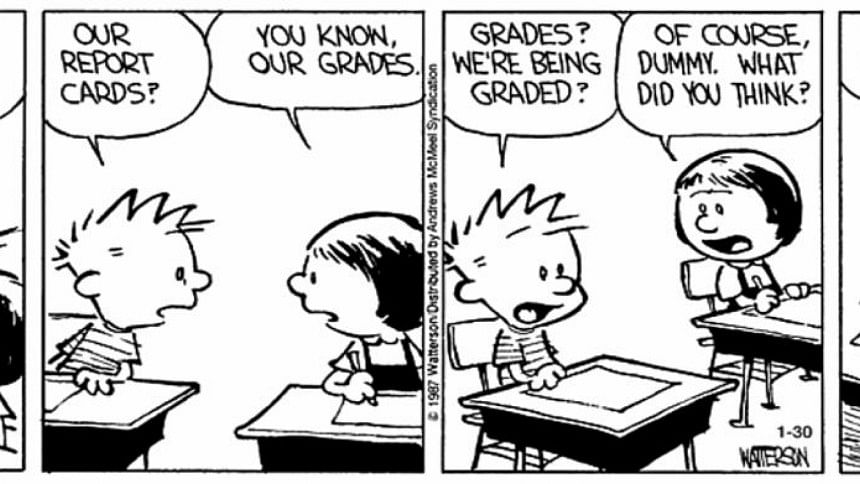Surviving the Transition from O Levels to A Levels

If the O Levels is Twilight, know that A Levels is Fifty Shades of Grey. However, it is possible to survive the transition, so here's an article with the collective advice and knowledge of everyone with some experience of A Levels.
SHEDDING THE PSYCHOLOGY
Drill into your head that this isn't O Levels. This task is especially important for those who are busy soaring from 10 A*s. Quoting Afrin Alvi (a student at City University of New York), "O Levels is like putting skates on, and A Levels is like trying to stand up and move." Going further, AS is standing up, and A2 is skating. The first few months of AS is spent more or less reviewing O Levels material, so it's understandable to get lulled into a false sense of security because everything feels so easy. Since I'm quite fun at parties, I'll have to burst that bubble by mentioning that it gets significantly worse.
You might be thinking, "But A Levels generally only has 3 to 4 subjects, right? Why would it be difficult?" That's because every subject delves into much deeper and complex topics, while approaching O Levels topics from plenty of new angles. Having studied quantum mechanics for one year, I can assure you, I STILL have no idea what they're talking about half the time. "Don't take a one or two month vacation, thinking you've worked hard from Class Nine and now you deserve a break," states Jannatul Ferdous, founder of Nerd Community. The inertia of "no studies, just holidays" will come back to bite you once you try to get back into the ballgame. The bite will be particularly strong if you don't cover up for your A2 results with your AS results. Trust me, A2 WILL hit you with a kilo of bricks, no matter how hard you study. While I do personally think you should take a break, don't overstretch it to the point of educational atrophy. As a friend of mine aptly stated, "Nothing's ended. The real stuff is just on the way. If you relax now, things will only get tougher."

BREAKING THE HABIT
"Don't cram." – literally every person I've talked to about this article. This is one of the largest distinctions between O Levels and A Levels because, quoting Israth Rahman (a 2017 A Level alumni of SFX Greenherald), "You can cover the O Levels syllabus in six months but even the entire A Levels term might not be enough to cover the syllabus." You studied hard to get your grades, but you probably memorised it all, and that's one sleeping dog that won't lie even if you tranquilise it. While "mukhostobidda" is fruitful for cramming, it's downright explosively bad in the long-run. You just spew out the info in the exams and then forget nearly everything. O Levels are your foundation; you WILL need the stuff you might have forgotten for the related subjects you intend to take in your A Levels.
Build proper schedules and work quotas for yourself. Doing this is relatively easier in A Levels due to fewer subjects. Even studying two hours per day for a year adds up to 730 hours, excluding the extra hours you'll obviously study prior to exams. It might not be that simple, but it's a good place to start. And no, it's not impossible to cram and do well, but that's 1 in 10 people, and it's safer to assume you will not be that someone.

DEPENDING ON YOURSELF
Considering that they'll do ten to thirty percent of the work, I should mention that it's not the best idea to rely entirely on your teachers. My O Levels teachers cared significantly more about the state of my studies as I'd been young, innocent and dumber. However, now they'll expect maturity, and frankly, less stupidity from your end. Yes, not all teachers will be like this, but most teachers will explain things only once or twice. Another factor playing into that, as stated by Muzahidul Quayyum, an A level Maths teacher of Mangrove School: "During O levels teachers and parents are more alert because it's the student's first board examination. They get adequate time to revise the contents and sit for tons of mocks. In A level the time is short and the teachers have a certain target to fill up in terms of completing the syllabus, so giving equivalent revision time is not possible." Ultimately, they're like liberal parents who let go of their kids at the age of 18: they'll help if you ask for it, but frankly, you're on your own. Going to multiple coaching centres and private tuitions will not change that fact.
Speaking of coaching centres and private tuitions, if you're (thinking of) going to any while you're already enrolled in a school, I advise against it. I'll let Shouvik Islam, a student at University of British Columbia, do the talking. "To Bangladeshi students, since it's a common mistake, know that it's a myth that you need coaching to do well in A Levels. Unless you're particularly weak at a subject, you really don't. Ask yourself: do you really need it or are you just going because it feels easier to be dependent and spoon-fed information? Chances are, you're wasting time, and after 9 months of coaching that'll add up to a lot. Just study alone or with friends; that way, you'll have adequate spare time to do things you love doing." However, there may still be some of you who are adamant about coaching, in which case, make well-informed decisions about the teacher before joining, and make sure you're comfortable with the environment, timings, and commute.

GOING OUTSIDE THE BOX
Your main textbooks, especially in Edexcel, are oftentimes lacking, or worse, actually missing stuff that will appear in your exams (first-hand experience in this case). Use them as a base, but build on it with other stuff. This other stuff includes:
1) Looking up further info on topics online (there are plenty of places to learn).
2) Making your own notes, since they'll allow you to understand the topic better and help retain more of it in your head, resulting in a decrease in the number of times you have to re-read something.
3) Taking notes and advice from A Level survivors.
4) Practicing timed question papers. Check them by yourself using the mark scheme, and check the examiner's report to better understand common mistakes in questions and how answers could be structured.
5) Reading through your subject specification, instead of hoping the teacher is teaching you everything.
6) "Praying to the flying spaghetti monster to bring you strength and vitality" – some wise words from Waliul Islam, a 2017 alumni from Mastermind Dhanmondi.
Uttam Dominic Gomes, an O Levels chemistry teacher at SFX Greenherald, says, "Students need to improve their involvement in extracurricular activities such as write ups about the current issues, debates, seminars, social work, charity, awareness programs, etc. which will help him or her to contribute in the society.It'll also help them to enrol in universities." Plus, ECAs are fun anyway, so why shouldn't you start one?
Now, at the end of all this, you might be wondering, "What's the point of studying so hard and getting great grades?" On one end, we have a student at UIU, Mohammed Sami: "If you're rich and with no aim in life, you keep doing you." On the other end, we have Shahrukh Ikhtear, Management Trainee at Grameenphone: "When you enter university, your A Levels grades won't matter at all, but good A Levels grades gives you access to the top universities of the world and they do make getting in a lot easier." Despite 10 A*s, your O Levels results are just formality. The real stuff is your A Levels grades, and you do NOT want to waste time with repeats and retakes.
However, despite all the information I've given you, it all comes down to you. Please try not to feel demotivated. A Levels is difficult, yes, but it's not as nightmarish as many people make it sound; in fact, if anyone told you it's nightmarish, there's a good chance that they crammed last minute. Finishing off with one last apt quote from another SFX Greenherald 2017 alumnus, Yosra Suzanne Rahman, "The fact is that every step in life is about hard transitions, and at the end of the day, no advice will help you until you experience the change on your own and adjust accordingly."
Rasheed Khan is a hug monster making good music but terrible puns and jokes where he's probably the only one laughing. Ask him how to pronounce his name at [email protected]





Comments